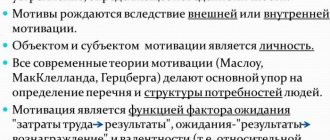Repression in psychology - This is a powerful tool for protecting the psyche from painful experiences and memories. Repression (other names: suppression, repression) is the basis for other psychological defenses. The suppression of traumatic impressions was described and ranked among the psychological defenses by Freud. He called it a mechanism that moves traumatic memories from the conscious part of the personality to the unconscious and “hides” there so deeply that until a certain moment a person does not even remember what he once experienced.
What is repression?
Repression (suppression, repression) is a type of psychological defense mechanism that involves keeping certain thoughts, feelings or impulses out of consciousness. The purpose of keeping unacceptable desires or thoughts out of consciousness is to prevent or minimize feelings of anxiety.
How does preemption work?
This process involves pushing painful or disturbing thoughts into the unconscious in order to remain “unaware” of them. This concept was first identified and described by Sigmund Freud, who played a major role in the development of psychoanalysis.
It's important to note that suppression is more than just avoiding a problem or trying not to think about it. True repression, from Freud's point of view, involves completely hiding something from awareness.
When a thought, feeling or urge is suppressed, you don't even know it exists. However, these hidden feelings may still influence your behavior and relationships.
To understand how repression works, you can look at how Sigmund Freud viewed the mind - he believed that the human mind is in many ways like an iceberg.
Think about what an iceberg would look like if you were looking at it from above. Only a small tip of the iceberg is visible above the surface of the water - this is similar to our consciousness.
Conscious mind
When we talk about consciousness being just the “tip of the iceberg,” we mean that only a small part of the iceberg is actually visible. It includes all the thoughts, feelings and memories that we are currently aware of or that we can become aware of.
Unconscious mind
Below the surface of the water there is a huge part of the iceberg that simply dwarfs what is above the water. The underwater part is like the subconscious - a huge reservoir of impulses, memories and thoughts hidden from our consciousness.
Freud believed that it is the unconscious that has a decisive influence on personality and can lead to mental disorder.
We may not be aware of what is in the unconscious, but its contents influence our behavior in various ways. By helping patients uncover their unconscious feelings, Freud realized that there was a mechanism that actively resisted these efforts to hide “unacceptable” thoughts.
Freud called this process repression, believing that it plays one of the most important roles in the human psyche. He even suggested that repression is "the cornerstone on which the entire structure of psychoanalysis is based."
Repression was the first defense mechanism identified by Freud. He considered it the most important. The process of Freudian psychoanalysis was based on the idea that bringing unconscious feelings into awareness could lead to relief from mental suffering.
Repression is a psychological defense mechanism in which a person redirects a negative emotion from its original source to a less threatening recipient.
A classic example of defense is repressed (displaced) aggression. If a person is angry but cannot direct their anger at the source without consequences, they may “take out” their anger on people or things that pose less of a risk.
Psychoanalytic treatment of neurosis
As noted above, suppressed as a result of repression
affect becomes
free
.
“...repression mechanisms have at least one thing in common - the removal of bound energy
." (Freud. “Repression”)
This free affect
and causes suffering, turning into
a symptom
, causing
depression
or otherwise annoying, transforming through
psychological defenses
.
“...it is not true that repression removes from consciousness all derivatives [derivatives] of what was initially repressed. Access to consciousness turns out to be completely free for them if, due to distortion or due to the large number of connecting links between them, they have sufficiently moved away from the main mental idea, primarily associated with drive. Using psychoanalytic technique, we constantly evoke in the patient such derivative products of the repressed, which can pass through the censorship of his consciousness either due to their distortion or distance from the primary repressed idea.” (ibid.)
It is thanks to the use of free technology
associations, the psychoanalyst can get to the repressed representation and the associated affect.
The task of psychoanalysis
is to reconnect
affect
with its representation and help the patient to experience this affect.
Thanks to such elaboration
, affect loses its sharpness, the representation turns into “just” a memory (narrative), the symptom disappears, depression weakens (see
Elaboration and reconstruction in the case of treatment of depression
).
TOP
Defense Mechanisms
When people experience negative emotions or urges, they often look for ways to cope with these unwanted impulses. Unlike the conscious coping mechanisms we use to manage daily stress, defense mechanisms operate on an unconscious level.
Repression, like many other psychological defense mechanisms, usually occurs subconsciously - the person is not aware that it is happening.
Defense mechanisms are one of the ways the mind unconsciously tries to reduce anxiety and restore emotional balance.
Psychological defenses operate without our awareness and help us cope with threatening people, things or the environment. We may not be aware of many feelings and impulses, but they influence our behavior and can cause anxiety.
When repression kicks in, our mind senses that reacting to the source of our irritation may be unacceptable or even dangerous. Instead, it finds a less threatening subject (or object) that can serve as a safer outlet for our negative emotions.
Sublimation
Sigmund Freud believed that a certain subtype of repression, called sublimation, serves as an important source of inspiration and creativity.
Sublimation involves the displacement of unacceptable sexual urges towards non-sexual activities (work and creativity) that are productive and socially acceptable.
Sublimation provides a constructive outlet for unacceptable urges.
Story
Sigmund Freud's daughter Anna Freud was one of the first psychologists to compile a list of defense mechanisms. Repression, however, was not included in this list, described in her book The Ego and the Mechanisms of Defense (first published in Germany in 1936).
Anna Freud later said that although her list included several famous defenses, she considered it far from definitive. Subsequent pioneers of psychology identified repression as an important ego defense mechanism.
Reactive education
Reactive education is a defense against forbidden impulses by expressing opposing impulses in behavior and thoughts. If a feeling cannot be expressed (for example, it does not correspond to social norms), it is replaced by the opposite.
For example, an older brother may experience aggression towards a younger brother, because... because of him, his parents began to pay less attention to him. Of course, showing your hatred for your brother is unacceptable, so aggression can unconsciously transform into overly active care.
Or a more banal example: a boy who pulls the pigtail of a girl he likes.
Repression Research
Research on the validity of repression has been mixed. A 1998 study found that crowding out was poorly supported by empirical data.
However, more recent research has supported the theory that states of physical and emotional arousal tend to transfer from one situation to another.
For example, although you may hold back in public when your reaction would be inappropriate, suppressing your feelings will not make them go away forever. Your emotional state will remain the same.
Later, when you find yourself in an environment where you can react with fewer consequences, you will release the feelings you previously suppressed.
Other studies have also found support for defense mechanisms, including displacement, as important for human health and relationships.
Examining data from a 70-year longitudinal study, a team of researchers found that psychological defense mechanisms can affect both the body and the mind.
In their paper published in 2013, the researchers stated that subjects who used adaptive defense mechanisms (including displacement) in midlife had better physical health later in life.
Researchers have suggested that protection plays a key role in creating strong and harmonious social relationships that promote improved physical health.
Regression
Regression is the process of adaptation to a situation when a person unconsciously resorts to forms of behavior characteristic of earlier stages of development, which, as it seems to him, guarantee protection and safety.
An example would be a girl driving for the first time. In a stressful situation, she may get scared, drop the steering wheel and close her eyes - this is a childish behavior that she unconsciously resorts to due to a strong feeling of anxiety.
How does preemption work?
Imagine that your manager reprimanded you at work. Taking out your anger or frustration directly on your boss would not only be unwise, it could even cost you your job. Instead, you bottle up (suppress) your emotions for the rest of the day.
My friend does this! ☝
Once you get home, you may take out your anger on your unsuspecting roommate or find yourself overreacting to your kids' misbehavior.
The reaction to the triggering event is most often disproportionately strong.
The anger you felt towards your boss is eventually released, but in an indirect way. The consequences of yelling at your roommate or your kids will be less severe than if you took it out on your boss or co-workers.
The object or person who becomes the subject of the repressed feelings may vary, but usually the one who is less dangerous (or even powerless) is chosen.
If you've ever taken out negative feelings on a friend, family member, or complete stranger when you were upset about something else, then you were using repression as a defense mechanism (even if you didn't realize it).
Moving Examples
Here are some sample scenarios (many of which may sound familiar) that illustrate the bias:
- The boss scolds an employee for poor performance during a presentation. An employee goes to lunch at a local restaurant, where he yells at the waiters because of a small mistake with his order.
- You are unhappy with your spouse because he does not help you with household chores. When you ask your children to start chores and they respond with whining, your anger erupts. You yell at them, accusing them of never helping around the house.
- A man is attracted to his wife's best friend, but he knows his actions will have disastrous consequences. Instead, the desire he feels is unconsciously repressed and he develops a sexual fetish for glasses like those worn by his wife's best friend.
- You lose your job and have difficulty finding a new one. Fearing that you will soon be unable to pay your bills, you begin to take out your frustration and sense of failure on immigrants, blaming them for your difficulty finding work.
Rationalization
Rationalization is the artificial creation of logical explanations for actions and failures. This is necessary to maintain a positive judgment of oneself.
For example, you need to call some person and agree with him about something. Let's say that for some reason you are embarrassed or even afraid of this. Then you begin to rationalize your refusal to make the call: it’s too late, you don’t need it at all, etc.
In many ways, we hesitate to admit to ourselves and unconsciously come up with rationalizations. They tend to be very logical and therefore difficult to recognize.
Unintended consequences
Repression can cause an unintended chain reaction. Repressed aggression, for example, can become cyclical.
For example, imagine an employee who is angry with his boss. He takes out his anger on his wife when they return home. Now they themselves are angry, spouses can be irritable with their children, and they, in turn, can take out their frustration on each other.
Repressed interpersonal aggression can also lead to prejudice against certain social groups.
For example, some scholars argue that the hostility that Germans felt toward the Jewish people after World War I may have been an example of repressed feelings of anger over the economic consequences of the war.
Instead of directing their collective anger at their own actions or their own government, people redirected their anger toward a group of people they perceived as less dangerous targets.
This phenomenon is also known as scapegoating.
What does the displacement depend on?
Defense mechanisms are very common and are usually a normal aspect of daily functioning. Repression as a defense helps us channel emotions and impulses that may be considered inappropriate or harmful into healthier, safer, or more productive outlets.
When used correctly, defense mechanisms such as repression protect us from negative feelings, help minimize frustration, protect our self-esteem and manage our stress levels.
But defense mechanisms such as repression can also be unhelpful when people rely on them too much or when they lead to problematic behavior and interactions with others.
Excessive use of defense mechanisms has been associated with psychological disorders and impairments in normal functioning.
Repression is a way to redirect feelings, but it can also cause harm. There are several factors that influence how and when displacement occurs.
- Age
Young children express their feelings more directly. Therefore, they are more likely to express their negative emotions towards the original target (regardless of the appropriateness of the response).
For example: a 4-year-old child, when he is unhappy, will most likely simply yell at his parent. A 14-year-old child may replace his disappointment in his parent with a quarrel with his younger brother. Children learn to cope with unpleasant feelings.
- Intensity
Severely upset feelings may lead to greater expression of emotion towards the substitute target. An inappropriate urge (such as wanting to hit someone) may be expressed as an emotional outburst (such as yelling at a spouse).
- Frequency
Most people have experienced taking out their negative emotions on a secondary goal. Although repression is a normal response, it can develop into inappropriate or abusive behavior.
Relying on repression as a defense mechanism to cope with all your emotional disturbances will be futile and may cause harm.
Introjection
Introjection is the inclusion by a person of attitudes, opinions, etc. perceived from other people. into your inner world.
Introjection plays several roles:
- Adaptive. Young children “absorb” the views and attitudes of their parents.
- Protective. For example, young children are in fact defenseless, but due to the appropriation of the qualities of their parents, they do not recognize themselves as such. In adults, this process takes the form of identification, which we will discuss separately.
- Destructive. This defense mechanism causes a person to perceive something external as something internal. Consequently, the loss of this external is felt as the loss of something internal.
Introjection also underlies the famous Stockholm syndrome.
What can you do?
Over-reliance on movement or any other defense mechanism can be problematic, or at least unhelpful.
If you are concerned about the use of repression as a defense mechanism, you can consult a psychotherapist or psychologist (read about the difference here).
Here are some ways to look at your own behavior to better understand whether you're using bias usefully:
- Grade
One of the first steps is also one of the most difficult: observing your behavior and actions and determining whether bias may be causing them. Displacement is not something that can be easily seen.
It may be helpful to work with a therapist at this point. He can put your behavior into perspective and help you see things from a more objective point of view.
The therapist is able to observe (and point out) inconsistencies between your behavior and your words, body language, or other cues.
For example, you may tell your therapist that you don't mind your spouse working late and on weekends, but your body language and speech may indicate otherwise.
As you talk about your behavior, it may become clear that when you are irritable with your children in the evenings, it really is a sign of the frustration you feel towards your spouse.
You can get specialist help here.
- Reflection
Reflection is a strategy therapists can use to help you recognize when you are using defense mechanisms such as repression. The therapist reflects your feelings back to you in a way that encourages you to think about what you have done or said.
The purpose of using reflection techniques is to identify hidden worries or fears that played a role in your behavior.
For example, when you talk to your therapist about how you express anger at a co-worker, you may be revealing one of your underlying problems—that your new manager doesn't recognize your talents and efforts.
Instead of expressing your emotions to your boss (a threatening goal), you took your frustrations out on a coworker (a less threatening goal).
- Reframing
Once you begin to recognize episodes of unhealthy bias in your own life, the next step is to find intentional ways to change your thinking and behavior.
For example, if you are yelling at your spouse because you are pushing your frustrations out of work, stop, step back, and take a moment to regain control.
When you find yourself engaging in inappropriate behavior caused by repression, try to reframe the situation and find a healthier outlet for your feelings.
Make a conscious effort to redirect your negative feelings towards an appropriate goal. Alternatives may include writing about the situation and how you are feeling on a piece of paper, engaging in sports, exercise or hobbies.
Reversion
Reversion is a psychological defense expressed in replaying a life scenario with a change in the places of subject and object in it. This mechanism is based on the principles of two others: identification and projection.
For example, a person does not have enough care for him, so he himself begins to care about someone and identify himself with this someone. Often it is this mechanism that underlies altruism.
Try to analyze your life experience and find in it a manifestation of the described protective mechanisms of the psyche. Which of them do you personally resort to? Will you be able to use the knowledge you gain to improve your life?
We wish you success!
We also recommend reading:
- Storytelling
- Behavioral mechanisms
- Social perception
- Personal authenticity: what it means to be yourself
- Defense mechanisms of the psyche and psychodiagnostics “Life Style Index”
- Manipulative Tactics of Toxic People
- Self-control and how to develop it
- Mechanisms of escape from freedom: theses of Erich Fromm
- Guilt
- Halo effect
- Spanish shame: what is it and what is the meaning?
Key words:1Self-knowledge











